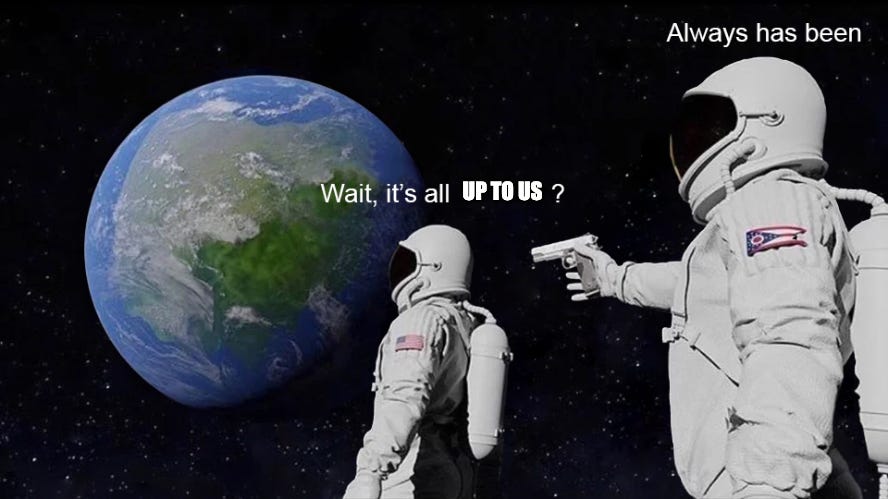Not many people remember Hurricane Irene. I do.
I remember huddling in the basement with my sisters when the tree struck the house. The sound of the trunk splintering across the roof wasn’t like the thunder — thunder doesn’t send concrete shuddering.
Mostly, I remember the powerlessness I felt, trapped in the depths of a home suddenly under siege, reduced to guessing what the wreckage above would mean for my family. This was 2011, a week or two before I left Connecticut for college, when climate change was something I still mostly associated with science textbooks and far-off decision makers. Not after I waded through white pine and shingles to survey the damage. I didn’t know it at the time, but from then on, there was no going home.
I don’t like reading the news during climate disasters because I don’t like feeling powerless. Doomscrolling through images of LA’s ashy villas and annihilated neighborhoods right now is paralyzing in a way that transports me back to the basement. I worry that as climate shocks become dizzyingly more common, I’ll get sucked into my phone, consuming someone else’s terror as my content. The endless supply of images of destruction makes me feel like I’m trapped inside the spectacle. What’s the way out?
I don’t think there is one, if our primary relationship to the crisis — whether it’s California infernos or the bombing of hospitals in Gaza – is one of spectator to event. Life will happen to us as a series of scenes, not even asking the barest minimum from us. We’ll buzz around the spectacle as users, posters, consumers, until the hall of mirrors floods. The canonic tweet:
The first thing to do, then, is to reconceptualize how we relate to the crisis, to recognize that we do, in fact, get to choose how to respond. This is very hard if the dominant communication platforms resist such reconceptualization (I guess that’s one reason why I’m writing here on Substack now). The spectacle – virality! views! emoji reacts! – is the business of venture capitalist-funded social media. It doesn’t matter to Elon Musk if the object at the center of the spectacle is a city set ablaze or the day’s main character posting through it.
Going offline, out of the machine, is a prerequisite to coming to terms with the choices we really do have in how to relate to each other and to the world. In instagram vernacular, I guess the way to say it is
Before the public was relegated to the role of passive spectator to the climate crisis, we occupied the role of perpetrator (which I wrote about a couple months ago in my post on narrative framing). It’s you, shrieked the fossil fuel execs and PR strategists, the gluttonous consumers who demand bigger trucks and ever more convenient delivery services who are responsible for the apocalypse engulfing the planet. This is straightforwardly true, but it’s unhelpful to the point of duplicity in ignoring the political economy of fossil fuel production. We are not, as the Chicago Boys would have us believe, rational self-interested consumers choosing to purchase oil at the market everyday with a cheery grin. We do it, grin or no, because of the vast apparatus of geopolitical forces and corporate interests that deliver it, invisible to us as we pump our gas. Those interests fight very hard to maintain the dominance of the fossil fuel economy.
So if not spectator or perpetrator, then who? Who do we become among the roll of the flames? How do we relate to these fires?
I think this is the question that all others have to flow from. It acknowledges that we – you and I – do have a relationship to the fires, and that we have some degree of autonomy in determining what that relationship is. Maybe all I can be is a spectator, but maybe I can be something different, too: an ear for a friend in grief, a coordinator of a mutual aid spreadsheet, a donor to those who lost their home, a citizen demanding an end to fossil fuel subsidies, someone who no longer wishes to feel so powerless.
But I do think we need to choose. The choice is otherwise made for us. We become spectators by default, with a complicity that then abrogates the objection, how could we have known?
If we are what we do, then let us keep Hannah Arendt’s words in mind and “think what we are doing.” It really is all up to us.
Burn After Reading
This week I was introduced — after a decade-plus in left-wing movement building — to the Gramscian concept of “conjunctural analysis.” I’m still wrapping my head around it, and a good starting place is Mark and Paul Engler’s introduction to Gramsci:
Movements must study the current “relation of forces,” or the social, political, and military balance of power between different groups. They must look at the changes taking place in society and determine which are “organic,” reflecting deep shifts in the economic structure, and which are merely “conjunctural”—short-term occurrences that may be “almost accidental” and lack “far-reaching historical significance.” Only through such careful preparation can they determine if “there exist the necessary and sufficient conditions” for social transformation, and whether a given plan of action is workable.
Such ideas would resonate with the thinking of other radicals, such as Detroit-based writer, organizer, and activist mentor Grace Lee Boggs, who counseled social movement strategists to ask, “What time is it on the clock of the world?” when considering their plans for action. Gramsci’s ideas also parallel concepts from other organizing traditions, such as the field of civil resistance, which emphasizes the role of both skills and conditions—that is, how historical circumstances and human agency each play a part in determining a movement’s success or failure.






